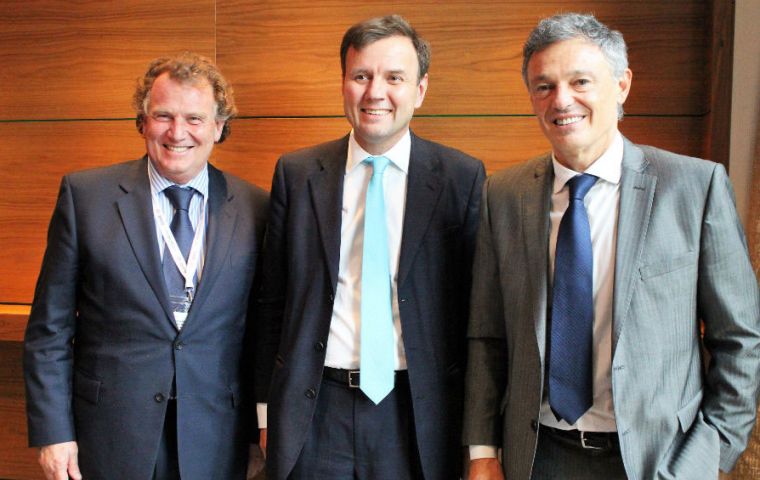MercoPress. South Atlantic News Agency
Argentina and UK agree to implement the trade and investment March MoU
 Ambassador Sersale di Cerisano, minister Greg Hands and Production minister Francisco Cabrera at the Embassy in London
Ambassador Sersale di Cerisano, minister Greg Hands and Production minister Francisco Cabrera at the Embassy in London Argentina and UK agreed to begin implementing in August/September the trade and investment chapters included in the in Memorandum of Understanding signed last March in Buenos Aires. Argentine Production minister Francisco Cabrera is currently in London for a round of business talks with the private sector but also met Trade and Investment minister Greg Hands to continue advancing with the MoU.
“We agreed to prepare a memo with opportunities in both countries so we can start working in the trade agreements and increase bilateral trade. The idea is that sometime in August/September we will meet again to keep advancing”, said Cabrera.
The Argentine official said that some of the issues addressed referred to energy, mining and the difficulties some British companies wishing to invest in Argentina are finding, and how up road it was to start a business.
However Cabrera told minister Hands that congress was in the process of approving an Entrepreneur Bill which “will help set up a company in 24 hours, and which should become effective in a few weeks. Hands said that was very good news”.
Cabrera was the main speaker at the World Trade Symposium 2017 in London, which held a special morning/afternoon meeting at the Argentine embassy, with ambassador Carlos Sersale di Cerisamo and representatives from BP, Unilever, Disney, Diageo, JP Morgan, Shell, London Stock Exchange and British Telecom among other companies.
During the questions period which followed, Cabrera said the first came from Diego Lerner, representing Disney, who asked “how can we be sure that Argentina won't return to its old practices referred to the working of courts and judicial security”.
“There has been a major institutional change in Argentina, and this is also supported by the opposition and the majority of governors”, replied Cabrera who also referred to productivity and logistics legislation which addresses bureaucracy and is geared to have the country open to new markets and new partners.
Cabrera mentioned that UK companies showed great interest in investing in shale deposits in Vaca Muerta and in renewable energies.
“Most British companies already in the country have decided to increase investments, while others are planning to do something similar”, indicated Cabrera.
In the afternoon the symposium addressed international trade and protectionism, with the attendance of company representatives, a few members of parliament and chaired by Shawn Donnan, Economics editor from the Financial Times.
Cabrera admitted that Argentina for too long has had an isolated, closed economy policy which “has been bad for us”, and time has shown that it only “harvested poverty”.
“It was a great seminar, and Shawn pointed out the fact that when some countries, leading countries, seem to be embracing protectionists practices, Argentina is going on the opposite way, opening its economy, looking for trade partners, attracting foreign investment, keeping to the rules of the game. It was very positive”, concluded Cabrera.
Last March when the MoU was signed in Buenos Aires it was also announced that UK Export Finance, the British government's export credit agency, agreed to offer export loans totaling up to 1 billion pounds (US$1.25 billion) to British firms seeking to pursue trade with Argentina.
The credit should help British companies obtain contracts - by providing attractive financing terms for loans - to carry out projects and secure insurance against the risks of operating in other countries.
The British delegation also signed an agreement with the Argentine Transportation Ministry to increase flights between the two countries. UK authorities proposed using Norwegian Air - in addition to British Airways - to provide the air services between the countries and Argentina accepted that recommendation.
Air Services director Mark Bosly signed the agreement for the UK.





Top Comments
Disclaimer & comment rules-

-

-

Read all commentsWhat the story doesn't say is that the small obstacle flights between the Falklands and other South American countries being prevented by the Argentine Government was also sorted out.
Jun 07th, 2017 - 09:08 am +3“Cabrera admitted that Argentina for too long has had an isolated, closed economy policy which “has been bad for us”, and time has shown that it only “harvested poverty”.”
Jun 07th, 2017 - 12:08 pm +3The Argentine trade official from Buenos Aires seems to directly contradict the obsolete ramblings of Enrique, the day-labourer ideologue from Alberta.
”has shown that it only “harvested poverty”.
Jun 07th, 2017 - 12:41 pm +3At last back to the real world, which can only help Argentina's economy and employment. At present at least, Argentina appears to be reversing its previous policy of financial implosion.
Commenting for this story is now closed.
If you have a Facebook account, become a fan and comment on our Facebook Page!